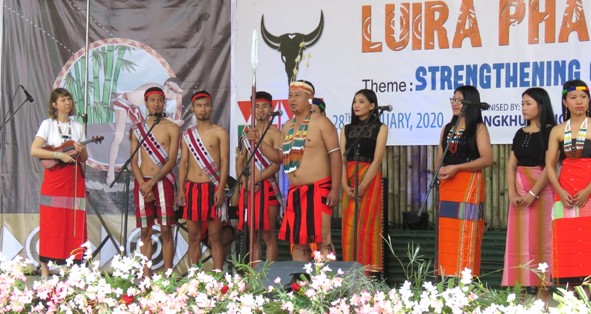Published on Feb 29, 2020
By EMN
Share

Our Reporter
Dimapur, Feb. 28 (EMN): Eastern Nagaland Peoples’ Organisation (ENPO) president T Kekongchim said on Friday that Nagas live in different places under different administrations but there is uniqueness among all tribes with certain similarities in customs, culture, and traditions which is why “we are called Nagas”.
Kekongchim said this at the Luira Phanit 2020 festival of the Tangkhul Union Dimapur which was celebrated on the theme ‘Strengthening Cultural Bonds’ at Nagaland Bamboo Resource Centre, Sovima, 6th Mile, Dimapur on February 28. He was the chief quest of the event.
Luira Phanit -- “Luira” meaning “field and to till” and “Phanit” meaning “festival” -- is an annual seed sowing festival of the Tangkhul community celebrated during the full moon of the last week of January and till the first week of March.
Kekongchim said that Nagas have been living in confinement surrounded by tribalism for a long period of time, which is why there is disunity among various sections of the people, and urged the gathering to come out of tribalistic attitude.
‘Nagas are too emotional in everything we do; instead of asserting what is wrong and right. Any person that is being driven by emotion will commit mistakes,’ he said, adding that in the present context, ‘Nagas have the attitude to dominate over other tribes’. He also urged the Tangkhul community to sow the seeds of unity, kill tribalistic attitude and move forward in unity.
The ENPO president lamented that Nagas are not willing to admit to their mistakes, which is their biggest demerit, while pointing out that great warriors always accept their mistakes. He added that Nagas will perish if they do not admit to their mistakes and ask for forgiveness.
Kekongchim appealed to the gathering to bury the past mistakes and take only the good deeds of the past “for the sake of our children and let us sow the seeds of unity and also understand the inconvenience of others so that we will have a peaceful generation in future”.
Speaking on the occasion, president of Ao Senden, Chubawati Longchar said that Nagas celebrate different festivals since time immemorial and each festival has its own significance, and that Luira Phanit is one of them.
He stressed on the importance to preserve one’s culture and tradition, especially for the young generation. He asked the youths if they know the ascent of folk songs and how to narrate folklore of their tribe. He went on to explain its historical and sociological significance in a society and meaning of names as they are the basic tenets on which knowledge and culture are rooted.
He advised the young generation to work on preserving their culture as it is their identity. He further urged the youths to gather as much knowledge and information as possible about their culture from their elders when they are alive so that they would not have the guilt of failing to pass on their unique culture to the next generation.
On the occasion, president of Tenyimi Peoples’ Organisation Timikha Koza said that Nagas are known for their hard work and advise not to demand from others as ‘it is a very bad habit’. He said that some Naga tribes are known for their culture of forgiveness and that Tenyimi people too should learn to forgive one another as forgiveness is divine. He also told the gathering to forgive one another and live together.
Koza lamented that Nagas are ‘very poor in discussion’ while stating that everything can be solved through “meeting and discussion”. He urged the youths to look for good seeds, sow good seeds for a good harvest and not expect good harvest without hard work.
He also touched upon the Naga political issue, stating that ‘we missed opportunities but now we have a golden opportunity; let us have a large heart and accommodate each other’. Those who sow seeds of disunity will be remembered as cursed ones but those who sow good seeds will be remembered forever, he said. “Let us sow good seeds, so that our future is bright.”
For the first time, the Tangkhul community of Dimapur celebrated its 48th Luira Phanit by inviting almost all the leaders of various tribes. Men folks were adorned with traditional ‘Mayo pasi’ (headgear) and ‘Haora’ (shawl) while women were seen in colourful traditionally-woven Changkhom (shawl) and sarong, and ornaments at the event.